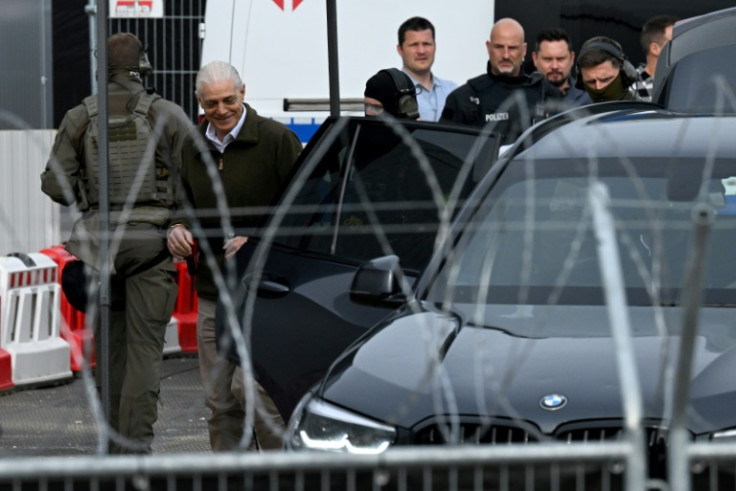
A prince, a former MP and several ex-army officers went on trial on Tuesday, accused of masterminding a plot driven by conspiracy theories to attack the German parliament and topple the government.
In one of the biggest cases heard by German courts in decades, prosecutors accuse the group of preparing a "treasonous undertaking" to storm the Bundestag and take MPs hostage.
The defendants, including one who covered his face with a file, took their seats in a specially built high-security courtroom in Frankfurt.
Eight suspected members of the coup plot will take the stand in Frankfurt, as well as one woman accused of supporting their efforts to overthrow Chancellor Olaf Scholz's government.
The minor aristocrat and businessman Prince Heinrich XIII Reuss, one of the group's ringleaders on trial, was said to be in line to become the provisional head of state after the current government was overthrown.
The sensational plan, foiled by authorities at the end of 2022, is the most high-profile example of a growing threat of violence from the political fringes in Germany.
The alleged plotters are said to have taken inspiration from "conspiracy myths" including the global QAnon movement and drawn up "lists of enemies".
They also belonged to the German Reichsbuerger (Citizens of the Reich) -- a political movement of extremists and gun enthusiasts who reject the legitimacy of the modern German republic.
According to prosecutors, the plotters believed Germany was run by a hidden "deep state" and were waiting for a signal from a fabricated international "Alliance" of governments to launch their coup.
The proceedings in the highly complex case, in which a total of 26 people face trial, are being held across three different courts.
Nine members of the group's "military arm" went on trial in Stuttgart at the end of April.
A third set of proceedings is scheduled to begin in Munich in June.
Among those in the Frankfurt dock next to Reuss are former soldiers Ruediger von Pescatore, Maximilian Eder and Peter Woerner, who are said to have founded the coup plotters' group in July 2021.
The defendants also include several members of a "council" that prosecutors say was to replace the government after the coup -- notably judge and far-right former MP Birgit Malsack-Winkemann.
Malsack-Winkemann, a justice of the peace and ex-member of parliament for the far-right Alternative for Germany (AfD) party, is said to have been lined up for the justice portfolio.
Investigators believe the 59-year-old had passed on her inside knowledge of the German parliament to help the group plan an armed attack on the Bundestag building.
Michael Fritsch, a former policeman from Hanover, was meanwhile allegedly in line to take over the interior ministry.
The ninth defendant is Reuss's partner, a Russian citizen identified as Vitalia B.
She is accused of "abetting" the alleged putsch plan and putting him in touch with a contact at the Russian consulate in Leipzig.
Reuss and the other alleged ringleader of the group, von Pescatore, also sought a meeting with Russian officials in the Slovakian capital Bratislava in February 2022, prosecutors said.
"How the Russian Federation responded, has not yet been clarified," prosecutors said.
Reuss was allegedly tasked with negotiating an accord with Russia in the event of the coup succeeding.
The threat from the far right has grown to become the biggest extremist menace to Germany, according to officials.
In April, police charged a new suspect in relation to a separate coup plan, in which five others have already been indicted.
The plotters, frustrated with Covid pandemic-era restrictions, planned to kidnap the German health minister, according to investigators.
Germany has seen an increasing number of attacks against public figures in recent years, since the murder of conservative politician Walter Luebcke by neo-Nazis in 2019.
This month, the former mayor of Berlin was attacked in a library, while a German member of the European Parliament was hospitalised after being jumped while putting up campaign posters.








